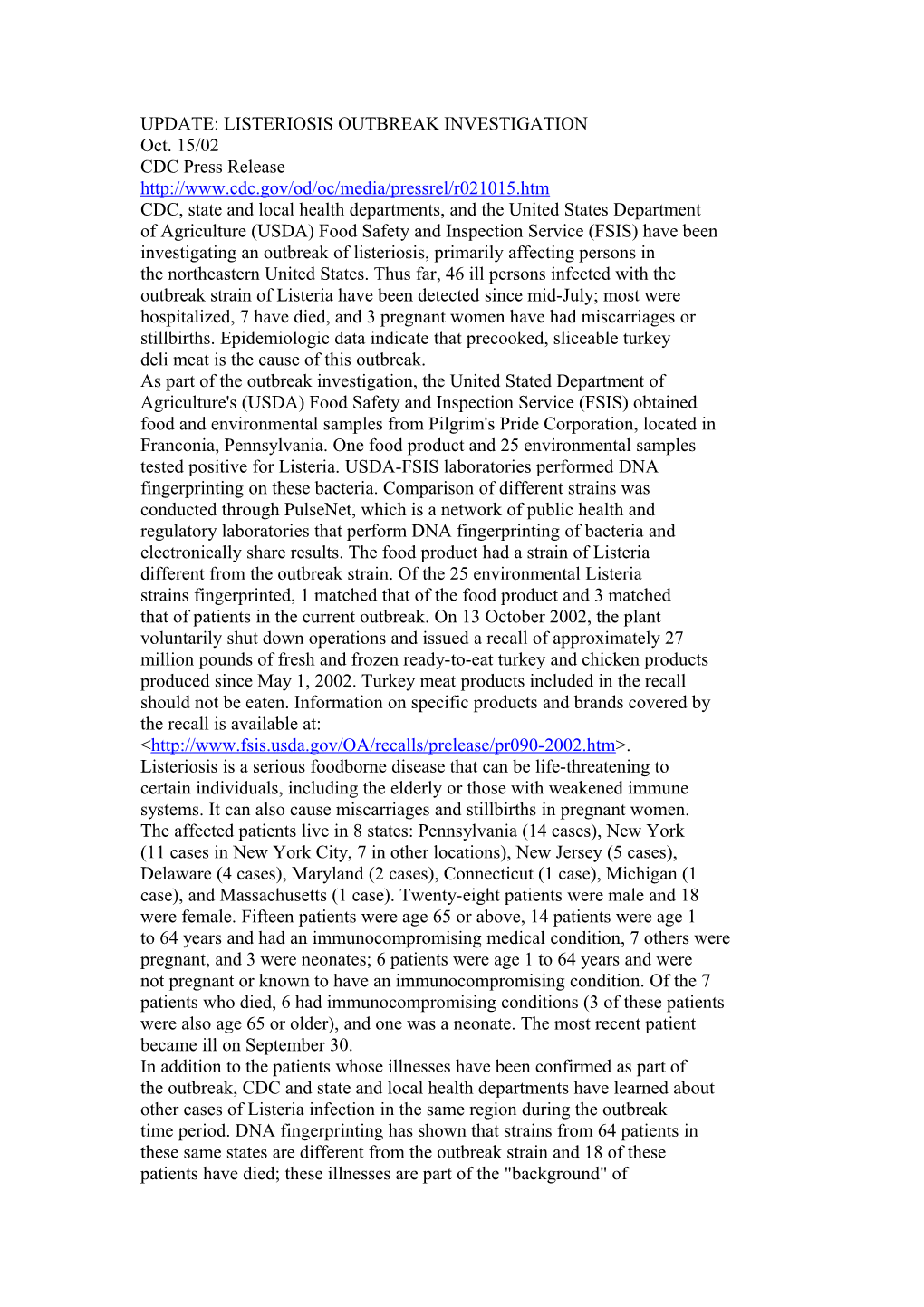UPDATE: LISTERIOSIS OUTBREAK INVESTIGATION
Oct. 15/02
CDC Press Release
CDC, state and local health departments, and the United States Department
of Agriculture (USDA) Food Safety and Inspection Service (FSIS) have been
investigating an outbreak of listeriosis, primarily affecting persons in
the northeastern United States. Thus far, 46 ill persons infected with the
outbreak strain of Listeria have been detected since mid-July; most were
hospitalized, 7 have died, and 3 pregnant women have had miscarriages or
stillbirths. Epidemiologic data indicate that precooked, sliceable turkey
deli meat is the cause of this outbreak.
As part of the outbreak investigation, the United Stated Department of
Agriculture's (USDA) Food Safety and Inspection Service (FSIS) obtained
food and environmental samples from Pilgrim's Pride Corporation, located in
Franconia, Pennsylvania. One food product and 25 environmental samples
tested positive for Listeria. USDA-FSIS laboratories performed DNA
fingerprinting on these bacteria. Comparison of different strains was
conducted through PulseNet, which is a network of public health and
regulatory laboratories that perform DNA fingerprinting of bacteria and
electronically share results. The food product had a strain of Listeria
different from the outbreak strain. Of the 25 environmental Listeria
strains fingerprinted, 1 matched that of the food product and 3 matched
that of patients in the current outbreak. On 13 October 2002, the plant
voluntarily shut down operations and issued a recall of approximately 27
million pounds of fresh and frozen ready-to-eat turkey and chicken products
produced since May 1, 2002. Turkey meat products included in the recall
should not be eaten. Information on specific products and brands covered by
the recall is available at:
Listeriosis is a serious foodborne disease that can be life-threatening to
certain individuals, including the elderly or those with weakened immune
systems. It can also cause miscarriages and stillbirths in pregnant women.
The affected patients live in 8 states: Pennsylvania (14 cases), New York
(11 cases in New York City, 7 in other locations), New Jersey (5 cases),
Delaware (4 cases), Maryland (2 cases), Connecticut (1 case), Michigan (1
case), and Massachusetts (1 case). Twenty-eight patients were male and 18
were female. Fifteen patients were age 65 or above, 14 patients were age 1
to 64 years and had an immunocompromising medical condition, 7 others were
pregnant, and 3 were neonates; 6 patients were age 1 to 64 years and were
not pregnant or known to have an immunocompromising condition. Of the 7
patients who died, 6 had immunocompromising conditions (3 of these patients
were also age 65 or older), and one was a neonate. The most recent patient
became ill on September 30.
In addition to the patients whose illnesses have been confirmed as part of
the outbreak, CDC and state and local health departments have learned about
other cases of Listeria infection in the same region during the outbreak
time period. DNA fingerprinting has shown that strains from 64 patients in
these same states are different from the outbreak strain and 18 of these
patients have died; these illnesses are part of the "background" of
sporadic Listeria infections and are likely due to a variety of different
foods. In addition, testing of strains from several additional persons is
ongoing, some of these may be identified as the outbreak strain. Because
pregnant women, older adults, and people with weakened immune systems are
at higher risk for listeriosis, we recommend the following measures for
those persons:
Do not eat hot dogs and luncheon meats, unless they are reheated until
steaming hot.
Avoid cross-contaminating other foods, utensils, and food preparation
surfaces with fluid from hot dog packages, and wash hands after handling
hot dogs.
Do not eat soft cheeses such as Feta, Brie and Camembert cheeses,
blue-veined cheeses, and Mexican-style cheeses such as "queso blanco
fresco." Cheeses that may be eaten include hard cheeses; semi-soft cheeses
such as mozzarella; pasteurized processed cheeses such as slices and
spreads; cream cheese; and cottage cheese.
Do not eat refrigerated pâtés or meat spreads. Canned or shelf-stable pâtés
and meat spreads may be eaten.
Do not eat refrigerated smoked seafood, unless it is contained in a cooked
dish, such as a casserole. Refrigerated smoked seafood, such as salmon,
trout, whitefish, cod, tuna or mackerel, is most often labeled as
"nova-style," "lox," "kippered," "smoked," or "jerky." The fish is found in
the refrigerator section or sold at deli counters of grocery stores and
delicatessens. Canned or shelf-stable smoked seafood may be eaten.
Do not drink raw (unpasteurized) milk or eat foods that contain
unpasteurized milk.
About 2500 cases of listeriosis occur each year in the United States. The
initial symptoms are often fever, muscle aches, and sometimes
gastrointestinal symptoms such as nausea or diarrhea. The illness may be
mild and ill persons sometimes describe their illness as flu-like. If
infection spreads to the nervous system, symptoms such as headache, stiff
neck, confusion, loss of balance, or convulsions can occur. Most cases of
listeriosis and most deaths occur in adults with weakened immune systems,
the elderly, pregnant women, and newborns. However, infections can occur
occasionally in otherwise healthy persons. Infections during pregnancy can
lead to miscarriages, stillbirths, and infection of newborn infants.
Previous outbreaks of listeriosis have been linked to a variety of foods
especially processed meats (such as hot dogs, deli meats, and paté) and
dairy products made from unpasteurized milk.
The risk of an individual person developing Listeria infection after
consumption of a contaminated product is very small. If you have eaten a
contaminated product and do not have any symptoms, we do not recommend that
you have any tests or treatment, even if you are in a high risk group.
However, if you are in a high risk group, have eaten the contaminated
product, and within a month become ill with fever or signs of serious
illness, you should contact your health care provider and inform him or her
about this exposure.
United States Department of Health and Human Services
Centers for Disease Control and Prevention
Office of Communication
Division of Media Relations
Update: Listeriosis Outbreak Investigation
